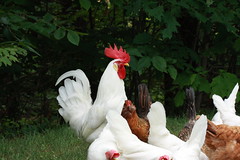Here in the north, all the chickens stop laying in the winter. The problem isn't the cold, but rather a lack of light. The hen's pineal gland is photo-sensitive and is the primary control for egg laying. When the days get short, the pineal gland doesn't get enough light and the hen stops laying eggs.
This means that it sucks to be an egg farmer in the winter. You get the expense of feeding the chickens, but no eggs in return. To make matters worse, they cannot free-range forage to cover some of their nutritional requirements.
My solution is to fake them out. I installed florescent shop lights in the coop. The lights are on a timer, and I give them about 15 hours of light each day. While they are not laying as many eggs as during the summer, we are still getting eggs. On average, we are getting about four eggs per week from each hen (about 25-30 eggs per day). If it is really cold out, you will want to gather the eggs a couple times a day - if you don't you will find some frozen and cracked.
The other winter issues include:
- Frostbite
- Frozen water
- Boredom
You need to have a well-ventilated coop, or your chickens are going to get sick and die. Of course, the ventilation means it will be cold in the coop. Of course, you don't want it to be drafty (no strong winds whipping through the coop), but you want plenty of fresh air.
There are a few things I do to make sure the cold is survivable. I make sure the chickens always have plenty of high-quality food and (liquid) water available. For feed, I use Blue Seal layer pellets. More on water below.
Chickens are susceptible to frostbite on their extremities: combs and toes. The hens seem to be smart enough to tuck their heds under a wing while roosting - I have yet to see any of my hens with comb damage from the cold. The roosters are another story. Apparently, they take their jobs as lookout pretty seriously. All my single-comb roosters end up with frostbite on the tips of the comb (and no tips by the next spring). If you live someplace cold and don't want to see roosters with frostbite, pick a breed with a small comb!
Hens and roosters alike can get frozen toes. I have not had this problem at all, because I did some research and figured out a sure-fire solution. Chickens love to roost on branches, and lots of people use actual branches or round dowels for roosts in their coop. It seems like a good idea and very "natural." The problem is that a 2" diameter round roost allows the chicken to wrap their toes around it and hang on. In the cold, they hunker down with their belly on the roost and fluff out their feathers for warmth. This keeps their legs and the tops of their feet warm, but their toes are exposed on the bottom side of the roosting bar.
My solution is to use a 2x4 piece of lumber for a roost. I mount it so the wide part of the board is parallel to the ground. The chickens stand on this wide, flat roost and when they hunker down their whole foot, toes and all, is covered with their nice, warm feathers. Mmmmm...snuggly....
As I mentioned above, plenty of liquid water is required in the winter. My chickens seem to drink more the colder it gets. Fifty chickens are drinking about five gallons of water each day. I use a standard five gallon metal font, sitting directly on a waterer heater (available anywhere chicken supplies are sold). Yes, this means you need electricity at the coop (run an extension cord out there, but don't run it over with a snow blower!).
The final winter problem is boredom. My chickens are used to getting out every day during the better weather, but in winter they are confined to the coop. They tend to pick on each other more in the winter than other times of the year. Patches of missing feathers are the most common sign of them picking at each other. If one starts to bleed, then the wound becomes an interesting target for more pecking.
I don't have a great solution for boredom. Unfortunately, chickens don't seem to go for "toys." I try to bring some food scraps to them every few days. They really enjoy it. For instance, we go through a lot of bread, and the chickens get the ends. If I toss a few ends around the coop, every gets excited and chases and pecks the food (rather than each other), at least for a few minutes.
How do you deal with bored chickens in the winter coop?


No comments:
Post a Comment